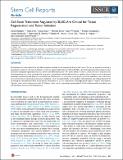| dc.contributor.author | Phillips, Sarah | |
| dc.contributor.author | Prat, Aleix | |
| dc.contributor.author | Sedic, Maja | |
| dc.contributor.author | Proia, Theresa | |
| dc.contributor.author | Wronski, Ania | |
| dc.contributor.author | Mazumdar, Sohini | |
| dc.contributor.author | Skibinski, Adam | |
| dc.contributor.author | Shirley, Stephanie H. | |
| dc.contributor.author | Perou, Charles M. | |
| dc.contributor.author | Gill, Grace | |
| dc.contributor.author | Kuperwasser, Charlotte | |
| dc.contributor.author | Gupta, Piyush | |
| dc.date.accessioned | 2015-04-08T18:01:53Z | |
| dc.date.available | 2015-04-08T18:01:53Z | |
| dc.date.issued | 2014-04 | |
| dc.date.submitted | 2014-03 | |
| dc.identifier.issn | 22136711 | |
| dc.identifier.uri | http://hdl.handle.net/1721.1/96452 | |
| dc.description.abstract | Perturbations in stem cell activity and differentiation can lead to developmental defects and cancer. We use an approach involving a quantitative model of cell-state transitions in vitro to gain insights into how SLUG/SNAI2, a key developmental transcription factor, modulates mammary epithelial stem cell activity and differentiation in vivo. In the absence of SLUG, stem cells fail to transition into basal progenitor cells, while existing basal progenitor cells undergo luminal differentiation; together, these changes result in abnormal mammary architecture and defects in tissue function. Furthermore, we show that in the absence of SLUG, mammary stem cell activity necessary for tissue regeneration and cancer initiation is lost. Mechanistically, SLUG regulates differentiation and cellular plasticity by recruiting the chromatin modifier lysine-specific demethylase 1 (LSD1) to promoters of lineage-specific genes to repress transcription. Together, these results demonstrate that SLUG plays a dual role in repressing luminal epithelial differentiation while unlocking stem cell transitions necessary for tumorigenesis. | en_US |
| dc.description.sponsorship | Breast Cancer Research Foundation | en_US |
| dc.description.sponsorship | Eunice Kennedy Shriver National Institute of Child Health and Human Development (U.S.) (R01HD073035) | en_US |
| dc.description.sponsorship | National Cancer Institute (U.S.). Breast SPORE Program (P50-CA58223-09A1) | en_US |
| dc.description.sponsorship | National Cancer Institute (U.S.) (Grant R01-CA148761) | en_US |
| dc.description.sponsorship | National Cancer Institute (U.S.) (R01CA125554) | en_US |
| dc.description.sponsorship | National Center for Research Resources (U.S.) (Grant UL1 RR025752) | en_US |
| dc.description.sponsorship | National Center for Advancing Translational Sciences (U.S.) (Grant UL1 TR000073) | en_US |
| dc.language.iso | en_US | |
| dc.publisher | Elsevier | en_US |
| dc.relation.isversionof | http://dx.doi.org/10.1016/j.stemcr.2014.03.008 | en_US |
| dc.rights | Creative Commons Attribution-NonCommercial-NoDerivatives | en_US |
| dc.rights.uri | http://creativecommons.org/licenses/by-nc-nd/3.0/ | en_US |
| dc.source | Elsevier | en_US |
| dc.title | Cell-State Transitions Regulated by SLUG Are Critical for Tissue Regeneration and Tumor Initiation | en_US |
| dc.type | Article | en_US |
| dc.identifier.citation | Phillips, Sarah, Aleix Prat, Maja Sedic, Theresa Proia, Ania Wronski, Sohini Mazumdar, Adam Skibinski, et al. “Cell-State Transitions Regulated by SLUG Are Critical for Tissue Regeneration and Tumor Initiation.” Stem Cell Reports 2, no. 5 (May 2014): 633–647. | en_US |
| dc.contributor.department | Massachusetts Institute of Technology. Department of Biology | en_US |
| dc.contributor.department | Whitehead Institute for Biomedical Research | en_US |
| dc.contributor.mitauthor | Gupta, Piyush | en_US |
| dc.relation.journal | Stem Cell Reports | en_US |
| dc.eprint.version | Final published version | en_US |
| dc.type.uri | http://purl.org/eprint/type/JournalArticle | en_US |
| eprint.status | http://purl.org/eprint/status/PeerReviewed | en_US |
| dspace.orderedauthors | Phillips, Sarah; Prat, Aleix; Sedic, Maja; Proia, Theresa; Wronski, Ania; Mazumdar, Sohini; Skibinski, Adam; Shirley, Stephanie H.; Perou, Charles M.; Gill, Grace; Gupta, Piyush B.; Kuperwasser, Charlotte | en_US |
| dc.identifier.orcid | https://orcid.org/0000-0002-9703-1780 | |
| mit.license | PUBLISHER_CC | en_US |
| mit.metadata.status | Complete | |
